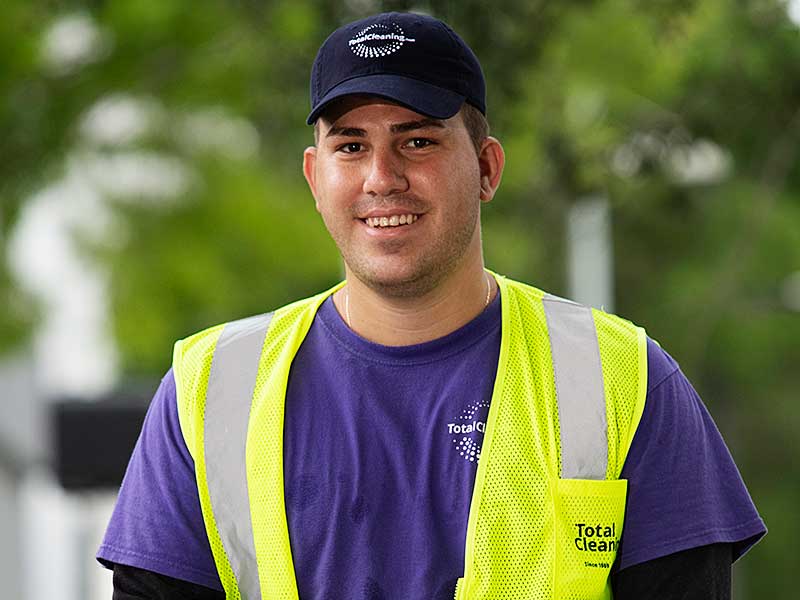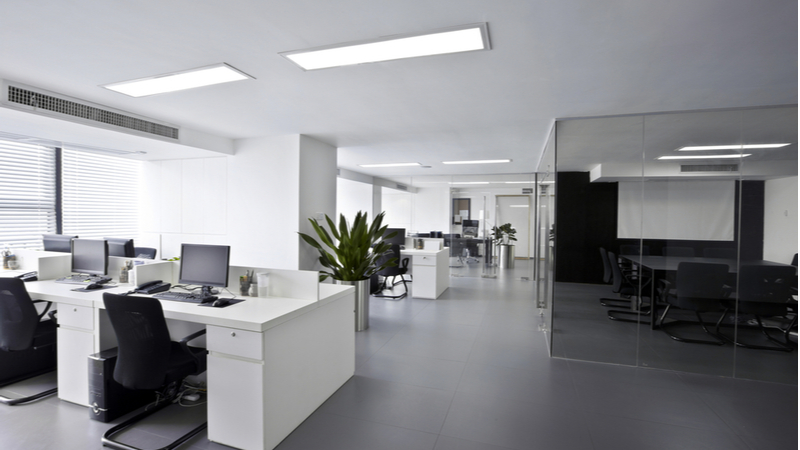For a moment, it looked like the world was returning to normal. Florida was one of the front-running states in lifting lockdown restrictions and forgoing mask mandates. When the vaccine rollouts began, it seemed like the tide could finally turn. But before Floridians could throw away their last mask, the Delta variant arrived. Now back in the red zone for Covid cases, Florida businesses hoping to bring back employees and keep them there have difficult decisions to make.
How do businesses and building owners keep employees safe amid the heightened health risk caused by the Delta variant? If getting workers back to the office is still the priority, businesses must employ ongoing enhanced cleaning and janitorial services.
To continue moving forward through uncertainty, employers must make a significant effort to keep their buildings clean and their people safe.
How the Delta variant is affecting Florida
With 1 in 5 COVID-19 cases occurring in Florida, virus variants cast a dark shadow across the Sunshine State. According to data from the Brown School of Public Health, Forbes reports that Florida, where only 47% of the population is fully vaccinated, sees an average of 49.3 new daily COVID-19 cases per 100,000 people, according to data from the Brown School of Public Health. That’s nearly double the amount to qualify for a red designation on the risk-assessment map.
As of August, federal health data showed that Florida’s daily cases increased 38% over a two-week period. Mayo Clinic stats reveal these case totals are almost twice that of California, the next highest state and higher than the bottom 30 states combined.
What happened to put Florida back in the red zone? According to the CDC, there are now four coronavirus variants of concern in the U.S.: Alpha, Beta, Delta, and Gamma. The Delta variant, currently responsible for more than 80% of COVID-19 cases, seems to cause more infections and spreads faster than earlier forms of the virus. A person infected with the original coronavirus could infect two to three other people. A person infected with the Delta variant can infect anywhere from five to nine.
The state of Covid restrictions in Florida
Florida Gov. Ron DeSantis, who has resisted mandatory mask mandates and vaccine requirements, recently passed S.B. 2006, a law limiting local officials’ ability to impose restrictions to stop the spread of COVID-19.
In some cases, Florida’s lack of restrictions and ban on restrictions makes it challenging for businesses to determine the safest path forward. However, many already planned to return their employees to office buildings by the fall, and the majority still want to move forward. According to a new CNBC flash survey, most human resource executives at large companies said they’re planning to bring their workers back despite the variant.
In fact, Forbes recently reported that company executives believe offices are more valuable than they previously imagined, and they see value in bringing teams back together to reestablish office culture. The same holds true for South Florida businesses. As remote work loses its luster, a Sun Sentinel article said that despite the state’s Covid status, Florida companies still conclude that the best place for most of their workers is back at the office.
That said, many businesses with returning workers face difficult decisions about how to operate openly and safely. For example, NPR reported that Walmart—the country’s largest private employer—will once again require workers to wear masks in regions most affected by the Delta variant. Publix, Florida’s largest grocery chain that employs almost 200,000, followed suit. According to these businesses, it’s necessary to implement policies and procedures against future outbreaks.
How do employees feel about going back to the office
Employers want employees back, but how do employees feel? A recent NPR interview showed the answer could vary by person and industry. While some look forward to reconnecting with colleagues and having social interaction, an employee who works in education said she cried after finding out she had to return to school.
Many employees have similar anxious feelings about returning to in-person work. Some have health issues that put them at greater risk. Others have caretaking responsibilities that prevent them from easily going back. The rest simply feel happier and more productive at home.
Harvard Business School study on remote workers found that:
- 27% hope to work remotely full-time
- 61% would like to work 2-3 days a week from home
- Only 18% want to go back to the office full-time
However, most workers don’t have a choice. According to Pew Research, most of the U.S. workforce can’t work from home because they work with people directly, like doctors and nurses or hairstylists, or they work with specialized machinery in a factory or laboratory.
Regardless of the scenario, it’s critical for employers to consider safety measures and enhanced hygiene protocols, as the Delta potentially grows much worse in the next few months.
Enhanced janitorial cleaning is the best way to make workers feel comfortable
Florida employers want to bring staff and patrons back safely. A the same time, businesses also must comply with the governor’s rules against mask and vaccine requirements. One of the most effective ways they can do both is by consistently cleaning, disinfecting, and encouraging hygienic offices.
In a recent Harris Poll, 86% of adults said they believe increased cleaning and sanitizing are essential in public areas. Yet sixty-five percent expressed concerns over their office’s current state of cleanliness. Nearly 60% said they were uneasy about working near colleagues.
People are aware that Covid can be transmitted through the air, as well as frequently touched surfaces. And they want their employers to do something about it. That’s it’s so essential to implement social distancing where possible and in high traffic areas. The best way to do this is to work with training on how to prevent and mitigate viral threats.
How to implement enhanced workplace hygiene protocols
First, employers should work with a trained commercial janitorial cleaning company to assess and identify the places where COVID-19 is most likely to spread. This process should pay special attention to high-traffic and high-touch areas and spaces where people are likely to gather, such as:
- Cafeterias and kitchens
- Breakrooms
- Waiting rooms
- Bathrooms
Next, businesses should follow the CDC’s Guidance for Cleaning and Disinfecting to develop a consistent plan to clean and disinfect the office or facility regularly. The CDC recommends:
- Cleaning surfaces using detergent or soap and water before disinfecting them.
- Cleaning once a day to sufficiently remove virus particles that might be on surfaces (unless there is a confirmed Covid case).
- Disinfecting kill any remaining germs and reduce the risk of spreading infections such as COVID-19 and the flu.
Florida businesses should also pay close attention to safety when cleaning and disinfecting. A few tips include:
- Storing and using disinfectants responsibly and appropriately according to the label.
- Avoid mixing bleach with other cleaning and disinfection products, which can cause fumes that are dangerous to breathe in.
- Ensuring adequate ventilation when using cleaning and disinfection products, which helps prevent people from inhaling toxic vapors.
- Wearing gloves and gowns appropriate for the chemicals used and providing additional PPE that employees might need based on the setting and product.
Despite the Delta variant challenges, it’s possible to bring workers back with health, safety, and comfort at the top of mind. For Florida businesses, the best approach is to work with a certified commercial cleaning company with the proper training, experience, and tools to protect them against pathogenic threats.
Total Cleaning provides full-service janitorial cleaning, disinfection, and hygiene risk management solutions for virtually all types of facilities and can consult with you to create and implement a hygiene plan for your business. It only takes a minute to request a free on-site assessment. Let us help you get the immunity boost your organization needs.



